14 Best Shopify Alternatives for Seamless eCommerce Solutions
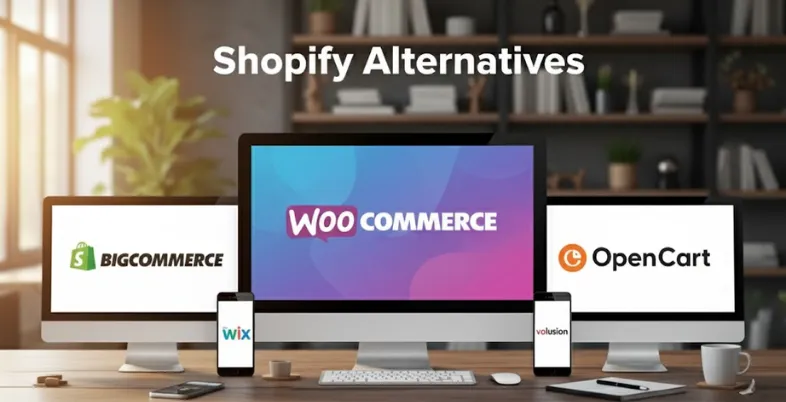
In case you want to establish an online shop and you are tired of Shopify, you are not the only one. Although Shopify is among the most used eCommerce platforms, it is not the most suitable one that fits all businesses, either due to its cost, functionality, customization, or payment. Luckily, there exists a great number of good Shopify alternatives that can assist you in building and running your web-based shop with a simple breeze.
Here in this blog, we will be discussing the most suitable options and their main characteristics, their prices, and benefits so that you can select the correct platform that fulfills your objectives, finances, and expansion strategies.
How to Find the Right Shopify Alternative for Your Business
The right Shopify alternative for a business can be determined based on the following:
- Ease of Installation and Operation: Select the platform that can be installed in a few minutes or set up without any code in case of limited technical expertise. Interfaces such as Zopping and Wix have user-friendly interfaces.
- Multi-Channel Selling Support: In case the sales on such websites as Amazon, eBay, and social media play a significant role, choose another platform that will be able to connect these places of sales channels effectively (e.g., BigCommerce, Ecwid).
- Scalability: Take into account the present size of business and the future growth. Such platforms as Magento or BigCommerce are designed to accommodate large inventories and heavy traffic, whereas smaller stores with a chance to grow use simpler platforms.
- In-house Functionalities: Compare features include built-in functionalities like SEO, multi-currency, B2B, and payment gateway. BigCommerce has superior native tools, whereas WooCommerce has a high level of customization through WordPress.
- Tailoring and Customization: Platforms can be either drag and drop (Wix, Squarespace) or they need to have technical knowledge but provide greater control (Magento, WooCommerce).
- Pricing: Evaluate initial prices and what goes with various plans. Others are free with paid hosting/ extensions.
List of 14 Best Shopify Alternatives To Consider
1. WooCommerce (WordPress plugin)
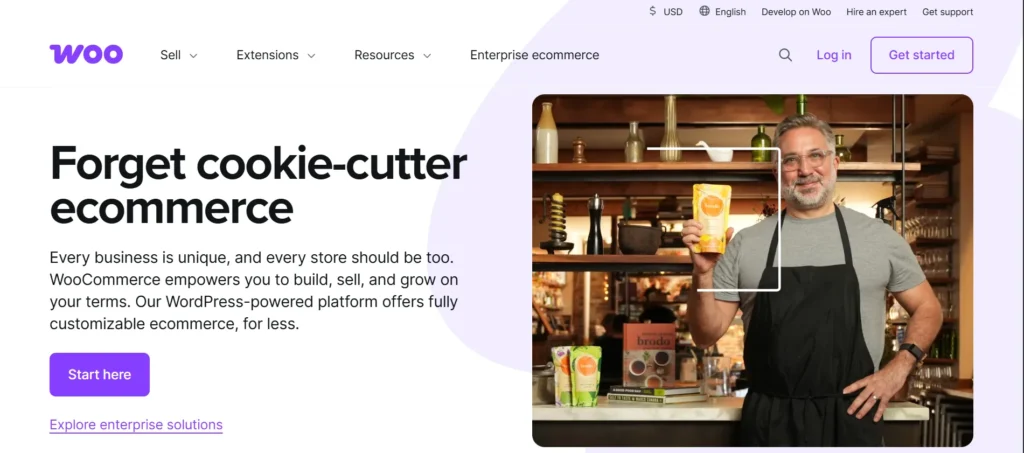
Website:https://woocommerce.com/
WooCommerce is a popular, open-source e-commerce application for WordPress that can be used to convert any WordPress site into a functioning online shop, where the business owner is able to sell either physical or virtual goods with ease and a wide range of customization features.
Plumbed into WordPress, WooCommerce is an integration of powerful product management solutions, customizable shipping options, hundreds of payment gateway options, and thousands of extensions, allowing low-volume and high-volume businesses alike to customize their online stores to their specific markets.
Key Features:
- Native and seamless WordPress integration because WordPress is easy to set up and maintain.
- Very personalized storefront, using flexible layouts, product displays, and design.
- Strong product and catalog management, distinctive product types, attributes, variations, and endless images.
- Higher filtering and sorting to have a better shopping experience.
- Inventory and sales management tools are built to monitor stocks and sales.
- Several payment gateways support credit cards, PayPal, Stripe, Amazon Pay, and others.
- Elastic shipping systems, rate calculation, and connections to large shipping companies.
- Full analytics and reporting, and easy integration with Google Analytics.
- A plethora of free and paid marketing, SEO, membership, and other extensions.
- Mobile optimization will provide the ease of shopping on any device.
- In-built customer feedback, rating, and review.
Pricing:
- WooCommerce basic version: Free – start an online store with full functionality.
- Premium extensions: From $49/year for advanced features.
- Higher-end extensions with extra customization: Around €39/year.
2. BigCommerce
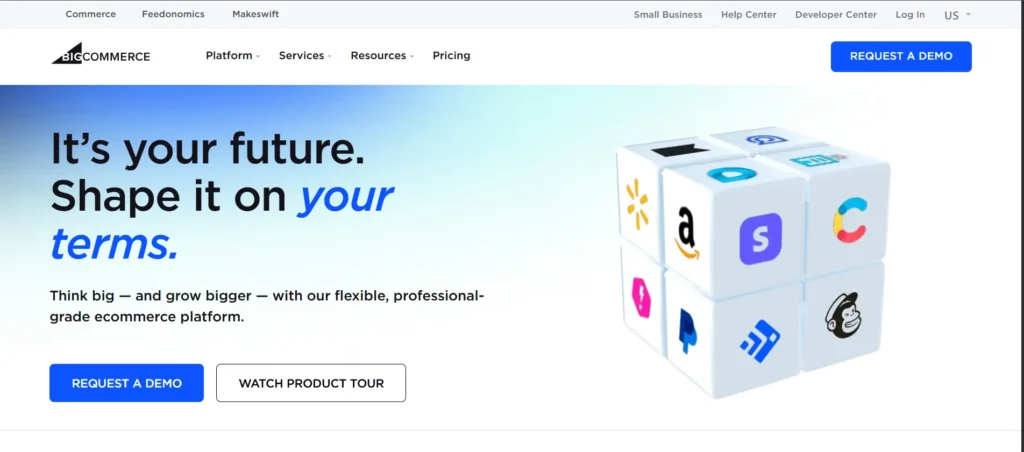
Website:https://www.bigcommerce.com
BigCommerce is a robust and renowned eCommerce software that is based on the principle of aiding companies of any scale to develop, operate, and expand their online shops. As one of the leading Shopify alternatives, it is highly customizable, scalable, and flexible, offering a rich set of built-in features such as product and inventory management, secure payment processing, shipping integration, marketing tools, analytics, and multi-channel selling capabilities.
The platform is easy to integrate with third-party applications and services, providing a friendly interface and APIs to enhance functionality even further. BigCommerce stands out because it implements native functionality, eliminates the need for additional applications, is fast thanks to Google Cloud, and supports both B2C and B2B business requirements. This makes it an excellent choice for expanding businesses and promoting them on a larger scale without technical constraints. If you are looking for BigCommerce Alternatives, there are several platforms that can offer similar features and flexibility.
Key Features:
- Bulk import/export product management, inventory management, and comprehensive product options and attributes.
- Storefronts are customizable and have pre-built responsive templates and drag-and-drop features.
- Safe payment processing with support of various payment gateways (PayPal, Apple Pay, Amazon Pay, and so on)
- Elastic shipping and real-time rate quotes, as well as connection to shipping services such as ShipStation.
- Customizable rule-based tax management and third-party automation.
- Checkout experience and mobile-optimized shopping.
- Included marketing tools such as discounts, coupons, and customer segmentation (loyalty, wholesale prices).
- Single-dashboard multi-storefront management.
- Detailed analytics and reporting software, including real-time performance data.
- Combination with third-party accounting, inventory, and marketing automation tools.
- Zealous scalability with many product SKUs and store personnel.
- Spam-controlled customer review and rating system.
- International sales in multi-currency and multi-lingual.
- This is an application based on Google Cloud and backed by Cloudflare to ensure high speed and stability.
Pricing:
- Standard Plan: Around $39/month
- Plus Plan: Around $105/month
- Pro Plan: Around $399/month
- Enterprise: Special prices for large corporations with sophisticated demands.
3. Magento / Adobe Commerce

Website: business.adobe.com/products/commerce.html.
The famous business eCommerce application is Magento (Adobe Commerce), which is implemented to support businesses of all sizes to create robust, scalable, and customized online stores to serve both the B2C and the B2B divisions.
It is based on a highly flexible and modular design, allowing merchants extremely comprehensive control over their storefronts, customer experiences, and integrations, and enabling omnichannel sales, AI-driven personalization, excellent analytics, order management, and integration with third-party systems with ease.
Key Features:
- Drag and drop page builder to create content easily.
- Artificial intelligence suggestions on products and search for customization.
- Single location catalog and inventory control.
- B2B advanced features such as custom catalog, pricing, and quoting.
- Live business intelligence analysis and dashboard.
- Scalability, security, and PCI-compliant delivery.
- Interoperability between it and popular payment gateways and ERP/CRM systems.
- Several stores are managed with one dashboard.
- Mobile commerce and Progressive Web Applications (PWA Studio).
- Strong security possibilities and compliance.
Pricing:
- Custom pricing based on business size and deployment.
- Starts at $22,000/year for Commerce edition.
- Higher packages add premium features and support.
4. PrestaShop
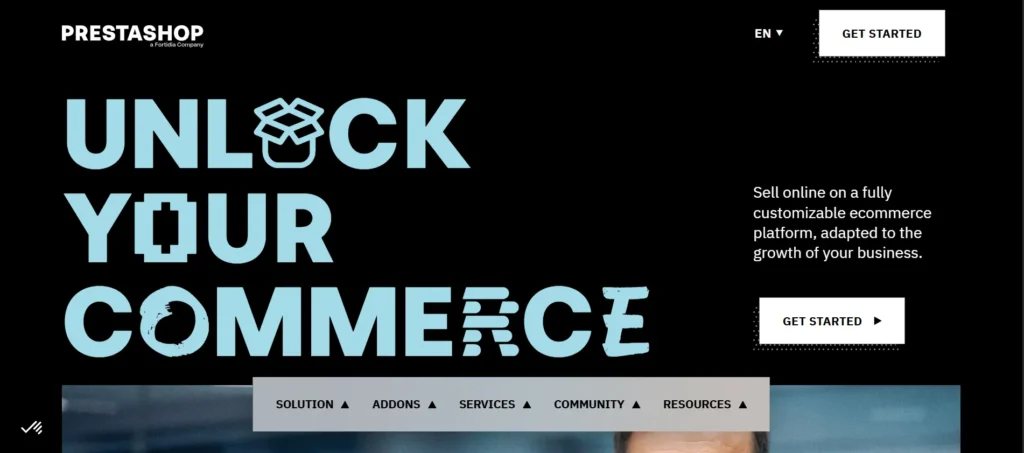
Website: https://www.prestashop.com.
PrestaShop is an open-source and free e-commerce, that allows users to build and manage online shops with a lot of flexibility and scalability. It provides an integrative array of in-built product management capabilities, payment processing capabilities, order handling capabilities, and marketing capabilities that can be accessed using a user-friendly back-office interface.
Thousands of themes and modules allow customization of the store at PrestaShop to suit the design and functionality of the store, making it easy to get merchants to optimize their online business. The platform is popular in the world market, it is multilingual and compatible with a wide range of payment gateways and shipping companies.
Key features:
- Themes and layout customization of storefront designs.
- Management of product additions, stock warnings, and electronic products.
- Shipping options, display of taxes, and payment gateway services.
- Promotions, coupons, email marketing, and SEO metadata management are some of the marketing and SEO tools.
- Automated email notifications (e.g., abandoned carts), customer management.
- Multi-currency and multi-language.
- Hi-tech analytics and reporting.
- Multi-channel order fulfillment and inventory management.
- The ability to be compatible with numerous add-ons and third-party integrations.
- Protective measures and optimization of performance.
Pricing:
- PrestaShop software: Open-source and free to download and use.
- Optional costs: Hosting, premium themes, modules, and services.
- PrestaShop Ready (hosted edition): Around €24/month (excl. tax) with hosting, pre-installed modules, marketing automation, and other features.
5. Wix eCommerce
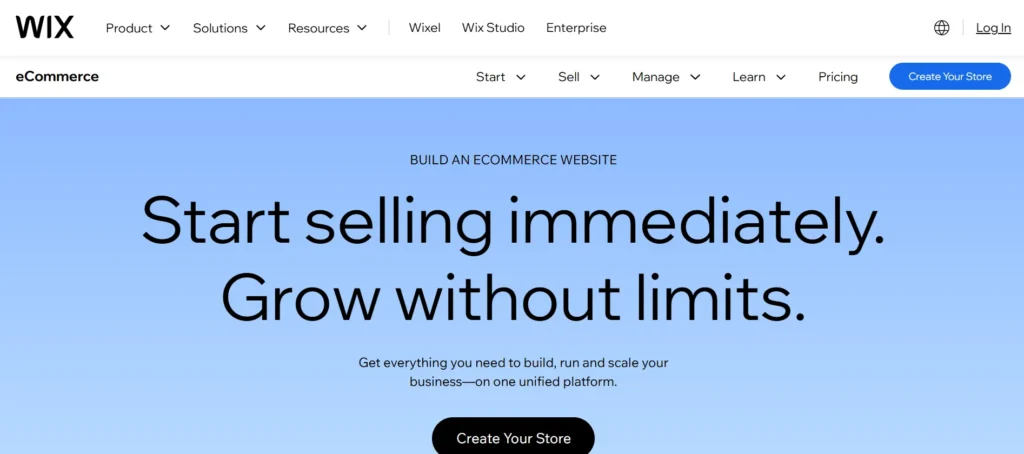
Website:https://www.wix.com/ecommerce
Wix eCommerce is a comprehensive, simple online store system that is targeted initially to small enterprises, startups, and entrepreneurs willing to have a fast, dependable, and economical means of constructing and expanding an online retail business. As one of the popular Shopify alternatives, it offers more than 500 editable templates based on drag-and-drop editing to suit brand aesthetics, powerful product and inventory tools for both physical and digital products, and support for various payment gateways, such as Wix Payments, PayPal, and Stripe.
It also provides shipping and fulfillment integrations, marketing and SEO tools, multichannel sales on social media like Facebook and Instagram, automated sales tax calculation, and mobile-friendly storefronts, making it a complete solution that helps businesses increase their eCommerce reach easily and flexibly.
Key features:
- Simple store customization using 500+ professional templates.
- Extensive product and inventory management (up to 50,000 products)
- Sells both physical and digital products, subscriptions, and variants of products.
- Several safe payment gateways, such as Wix Payments, PayPal, Stripe, and Apple Pay.
- Flexible shipping rates and shipping, and fulfillment integrations.
- Included marketing tools such as email marketing, abandoned cart recovery, and SEO tools.
- Selling in multiple channels on Facebook, Instagram, eBay, Google Shopping, etc.
- Automated sales tax calculator and currency converter.
- Storefront and mobile editing tools are optimized for mobile.
- SSL security and custom domains were included.
- High-tech analytics and store performance management.
- App and customization through other third-party apps and API flexibility.
- Customer services such as wishlist, tracking orders, and express checkout.
Pricing:
- Basic Business plan: Around $27/month.
- Advanced plans: Higher pricing based on features.
- Free trial: 14 days.
- Prices may vary by region and selected features.
6. Squarespace Commerce

Squarespace Commerce is a one-stop ecommerce solution that enables companies to easily build and operate beautiful online stores. It offers an easy-to-use interface and is templated to present the products professionally, sells physical, digital, and service-based products, and has extensive inventory management, secure payment processing, and automated calculation of tax and shipping tools.
The platform also has advanced marketing, such as abandoned cart recovery, discount code management, social selling integration, and email marketing integration to increase sales and attract customers. Other advantages are customer account management, upsell/cross-sell recommendations, multi-language/currency, and third-party applications integration, making it scalable to expansive enterprises.
Key features:
- With images and layouts of high-quality customizable product pages.
- Inventory alert and type products.
- Safe, credit card and PayPal, Apple Pay, Stripe, and Authorize.Net processing.
- Recovery email messages are abandoned.
- Gift cards and discount codes administration.
- Integration of social selling on social networks such as Facebook and Instagram.
- Shops and checkout optimization: Customizable shopping cart.
- Automation of tax and shipping.
- Customer account management for an improved shopping experience.
- Upsell and cross-sell product recommendations.
- Inbuilt email marketing and email campaign capabilities.
- Multi-currency and multilingual global sales.
- Third-party app and extension integration.
- Squarespace application mobile management.
- Point of Sale (POS) option on physical sales (US only)
- Invoicing and client management solutions.
Pricing:
- Basic Commerce: ~$26/month (billed annually)
- Advanced Commerce: From ~$40/month (billed annually)
7. Ecwid
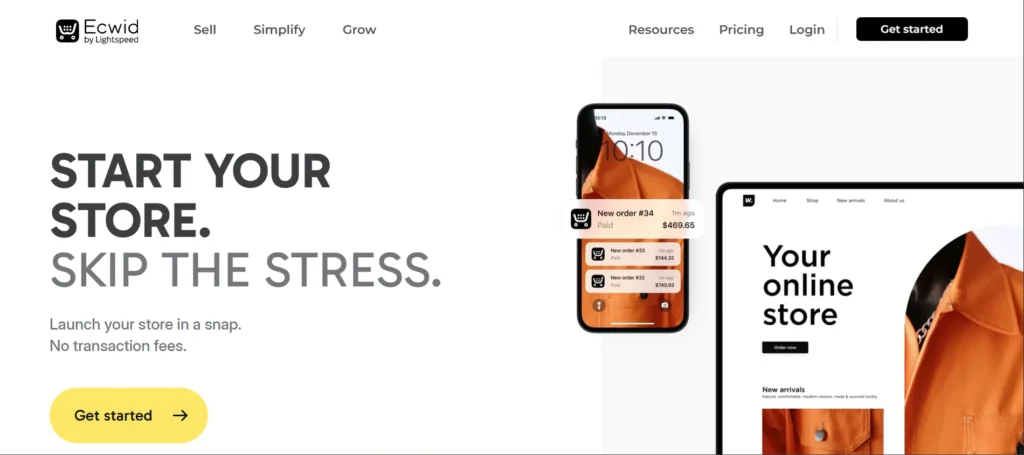
Website:https://www.ecwid.com
Ecwid is an online store providing the means of adding an online store to already existing websites that an individual or a business does not need to develop a new site. It is a web-based platform that enables sellers to manage their stores, products, orders, and deal with customers through one control panel.
Ecwid is global, and it has over a million sellers in 175 countries. It is user-friendly, has flexible payment options, a product index, and sells on multiple channels through the websites, social sites, and marketplaces.
Key features:
- Automatic updates
- Inventory tracking
- Improvement of the shopping experience.
- Digital goods selling capability.
- Save favorite products
- Smart shipping calculator
- Easy checkout process
- Customer address book
- Promotions and discounts will boost sales.
- Take various modes of payment.
- Multilingual and language identification abilities.
- Sell on various places at the same time.
- Control product varieties and selections.
- Define shipping options
- Professional SEO programs and Facebook advertising.
- Automated tax calculations
- Abandoned cart recovery
- Availability of market extensions on apps.
- Mobile responsiveness and social commerce.
Pricing:
- Free (Starter): Sell 5 products.
- Venture ($30/month): Sell not more than 100 products.
- Business ($55/month): Sell up to 2500 products.
- Unlimited ($130/month): Unlimited products and all the advantages, such as priority support and advanced integrations.
8. OpenCart
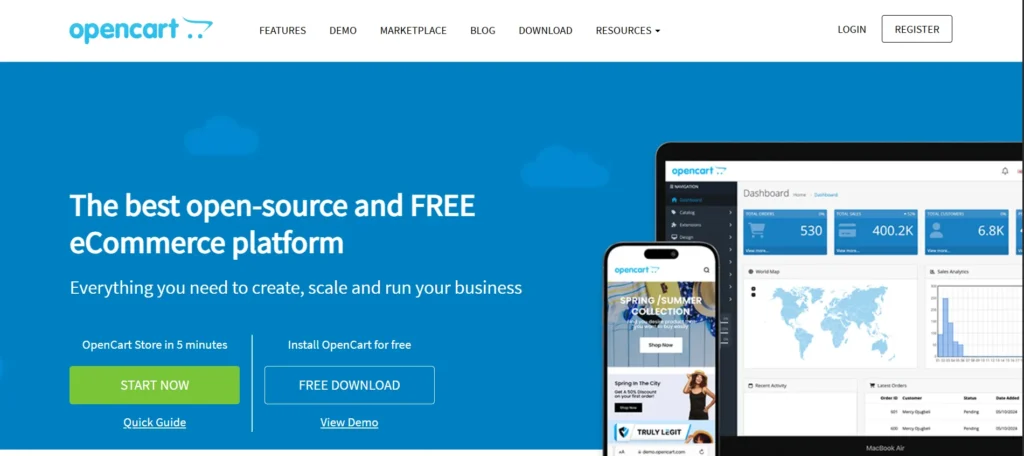
Website: https://www.opencart.com
OpenCart is a widely used open-source eCommerce platform that enables companies to establish and run online stores easily. As one of the notable Shopify alternatives, it features a user-friendly administrator interface and powerful capabilities, including multi-store management, unlimited product listings, flexible product options, and a comprehensive affiliate system.
OpenCart supports a wide range of payment gateways, multiple currencies, multiple language options, and SEO-friendly features, making it ideal for businesses looking to customize and expand their online presence. Additionally, OpenCart offers backup and restore options and excellent community support for continuous improvement. Being open-source, it is free to download and use, though additional costs may arise from premium themes or extensions.
Key features:
- Single-user multi-store management.
- Products and categories are unlimited.
- Adjustable product features and choices (size, color, etc.).
- In-house affiliate marketing system.
- Multi-lingual and multi-currency.
- SEO-friendly architecture and mobile-friendly design.
- Full-scale payment gateway (PayPal, Stripe, and so on).
- Management of coupons, discounts, and special offers.
- System of product reviews and ratings.
- Backup and recovery facilities.
- Highly sophisticated product filters so that customers can easily browse.
- Customer loyalty reward points system.
- Online product management of downloadable products.
- In-depth sales reporting and analytics.
- Massive marketplace containing 13000 plus modules and themes.
Pricing:
- OpenCart software: Free to download and use
- Optional costs: Premium themes, extensions, and hosting services
9. Shift4Shop (formerly 3dcart)

Website: shift4shop.com.
Changes in 3dcart to Shift4Shop. Shift4Shop is a full cloud eCommerce solution that enables companies to build, operate, and expand their online stores with a powerful collection of ready-to-use features. It has a secure shopping cart, unlimited products and orders, a variety of payment gateways such as digital wallets, advanced inventory and order management, integrated with inbuilt SEO tools, marketing and customer engagement, and real-time shipping.
The site is applicable to both large and small businesses, and it is flexible with theme customization, automation features, B2B features, and multi-channel selling features. The subscriptions, pre-orders, and customer loyalty programs are also supported by Shift4Shop, which makes it a one-stop online retail solution.
Key features:
- No transaction fees
- Free domain registration
- Secure shopping cart that is 2-factor authenticated.
- Infinite products, orders, bandwidth, and product variants.
- Live freight quotations and labeling.
- Single-page checkout
- Guest checkout on customer store accounts.
- Goods stocking and mass data in/out.
- CRM and high-level customer management.
- Online downloading and subscriptions.
- Reviews and questions and answers, and comparison tools.
- Built-in SEO tools and blog
- Several payment gateways and Shift4 Payments connections.
- Discounts, coupons, loyalty programs, and affiliate programs are some of the marketing tools.
- Multi-store management / multi-channel management.
- High-level reporting and QuickBooks integration.
- Automation policies and upsell/cross-sell.
- B2B functions like customer-specific prices and purchase orders.
- Responsive themes are mobile-optimized.
- Support with marketplaces such as eBay and Amazon.
- The integration of social media and Google Customer Reviews.
- Return Merchandise Authorization (RMA) module.
- Pre-orders and recurrent orders (autoship).
- Promotion scheduler and back-in-stock alerts.
Pricing:
- Not public; available on demand
10. Hostinger Website Builder (including Zyro)

Website: https://www.hostinger.com
Hostinger Website Builder is a web-based service that was formerly known as Zyro, combining the ease of use of Zyro’s web-building features with Hostinger’s formidable web hosting services. It allows them to create professional, mobile-friendly websites, blogs, portfolios, and online stores in a few seconds, and with no knowledge of code.
The developer contains AI-aided applications that can be used to build complete websites, create content that can be easily optimized in search engines, logos, and heatmap analysis of visitors. One dashboard will allow the users to manage sites, domains, hosting, and business emails without any complexities. Hostinger Website Builder is a drag-and-drop web building site with templates, artificial intelligence-based, and customer support at its best.
Key features:
- Create your website with the help of AI on the basis of a short description.
- Website editor with templates that can be customized.
- Website management smartphone mobile editor.
- Artificial Intelligence content generation, AI-Writer, and AI-Logo Maker.
- Automated AI-powered focus control of pages.
- Infinite bandwidth and complementary SS.
- Premium plans come with a free domain and email inbox.
- E-commerce characteristics (sale of up to 500 products)
- Backup every week, use two-factor authentication, and email authentication.
- Fast website loading speeds
- Business email integration.
- The availability of a library of free images.
- Various payment modes to e-commerce.
- Detailed documentation and Hostinger Academy materials.
- Multilingual customer support (24/7) and responsive customer care.
Pricing:
- Premium Website Builder Plan: Beginning at $2.99 per month (without ecommerce), for website building.
- Business Website Builder Plan: Begins with $3.99 per month (with ecommerce up to 500 products)
11. Zoho Commerce

Website: https://www.zoho.com/commerce/
Zoho Commerce is a single platform that enables businesses of any size to build, operate, and expand their online stores with ease, with no need for coding. It has a drag-and-drop website creator, inbuilt inventory and order control, a variety of secure payment gateways, and on-site marketing and search engine optimization features to enhance presence and sales.
Zoho Commerce also develops flawlessly with other Zoho applications, such as Zoho CRM and Zoho Inventory, thus allowing easy customer and stock management. Its customizable functions, such as multi-currency, automated email, product suggestions, and shipping options, enable business owners to build a professional, scalable e-commerce platform supported by data analysis and instructional services of Zoho and Google.
Key features:
- Drag-and-drop e-commerce designer with custom and responsive themes.
- Multi-warehouse tracking and integrated inventory management.
- Integrated secure payment gateway (PayPal, Stripe, Razorpay) involving world currencies.
- Automated orders and shipment rates processing, and the generation of invoices.
- Search engine optimization, cart recovery, and email newsletters.
- Google Shopping and Facebook Pixel to promote and advertise.
- B2B personalized tax rules and account portal, Customer segmentation, and customer account portal.
- Filtering of products, reviews, and sophisticated coupons.
- Zoho Finance suite and CRM integration.
- Statistics and insightful business intelligence.
- Blogs and landing pages content administration.
- Training and technical support, such as Google marketing training.
Pricing:
- Zoho Commerce plans: Tiered pricing to suit different business needs
- Starting price: Around $14/month for basic features
12. Dukaan (India-focused)
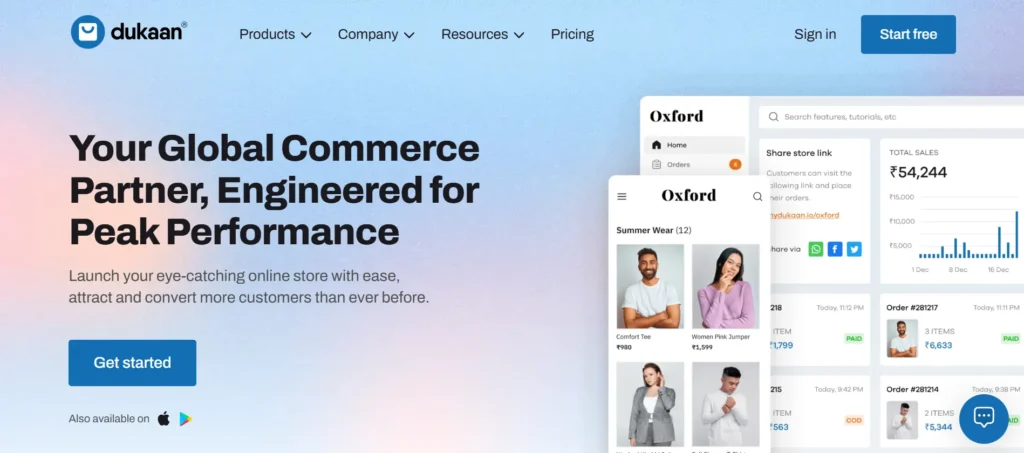
Website: mydukaan.io.
Dukaan is an Indian-based e-commerce enablement firm that intends to provide small and medium-sized businesses (SME) and local shop owners the power to create and operate online stores within a few minutes, and no coding required. Omegaa and Sukhs co-founded Dukaan, a company that was launched in 2020 and will digitize the physical stores in India and help over 3 million merchants sell products online, make orders, and make online payments without the hassle.
It has a mobile-first interface that is easy to use, such that even non-technical users can open customized stores in just seconds. Dukaan has expanded quickly because of offering them such features as customizable themes, marketing tools, smooth payments, and fraud prevention, which has turned it into a reputable option to enable local companies to expand their online presence and increase sales.
Key features:
- No-code, immediate online shop building.
- Ease-of-use platform based on mobile.
- Store themes and brand stories that could be customized.
- Artificial intelligence to enhance search engine presence.
- Single-page checkout to speed up checkout.
- Flexible shipping solutions that cover large pin codes in India.
- Storefronts: Multi-language support.
- Stock override and marketing automation.
- Additional labels to organize orders and products in a better way.
- Dukaan Delivery to make shipping a hassle.
- Fraud detection and prevention software.
- Specific areas in high-end plans.
- Reselling business support using Dukaan Plus.
Pricing :
- Free Plan: Free basic features to begin with.
- Starter Plan: ₹2,999/year, which is appropriate for small stores with basic needs.
- Growth Plan:₹999/year, to expand businesses with more advanced features.
- Infinity Plan:₹59,999/year, when the business is at the enterprise level and has complete access to features.
13. Instamojo (India-focused)
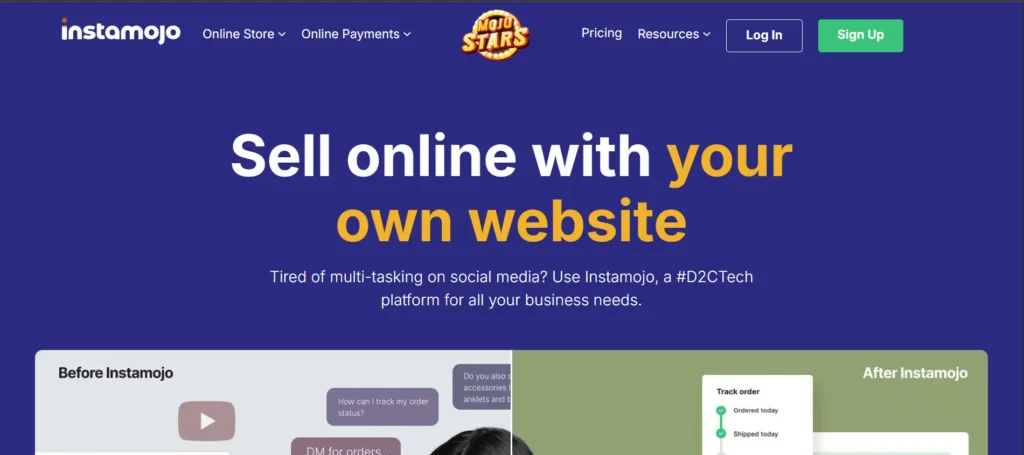
Website:https://www.instamojo.com
Instamojo is an India-based, fully digital platform that was started in 2012 and helps small businesses, startups, and freelancers develop and develop an online presence without any big problems. It offers a plethora of services, including a free online store, integration of payment gateway, shipping services, and even business capital financing, which is why it is a complete package for MSMEs to digitalize operations and sell goods or services online.
Instamojo is reputed to have a user-friendly interface and accepts various forms of payment, such as UPI, credit/debit cards, wallets, and EMI payment options, and serves more than 1 million businesses in India. It is a SaaS based company that has transaction fees and premium subscription packages that provide advanced features, hence facilitating flawless e-commerce and collection of payment on behalf of its users.
Key features:
- Activated instantly with no set-up fee.
- Various payment methods such as UPI, credit/debit cards, wallets, and EMI.
- Simple integration with sites, mobile applications, and social media networks.
- Creation of a physical and digital goods online store (mojoCommerce), free of charge.
- Shipment solutions in 12000+ pin codes of India (mojoXpress)
- Business capital financing (mojoCapital)
- Quickly collect payment buttons and smart payment links.
- Bill and invoice management and subscription billing.
- Safe transactions and fraud detection.
- Friendly APIs and plugins for developers.
- Tailored customer checkout.
- Further-developed analytics and reporting.
- Community resources and customer support.
- Mobile payments and international acceptance of payments.
- Webhook and in-built marketing tools.
- App store to integrate third-party applications with Instamojo.
Pricing:
- Basic/Free Plan: $0/year
- Transaction fee: 5% + ₹3
- Fast Track: $0/year
- Transaction fee: 2% + ₹3
- Unlimited payment links and analytics
- Smart Plan: ₹4,999/year or ₹1,499/month
- Transaction fee: 2% + ₹3
- Features: Expiry settings, discount codes, custom links, data collection
- Pro Plan: ₹12,999/year or ₹2,499/month
- Transaction fee: 2% + ₹3
14. SlideCommerce / Shopline / Asia-Pacific localized platforms

Website: https://www.shopline.com
SlideCommerce is a localized eCommerce service that aims to facilitate smooth social commerce and online store building, focusing on markets in Asia and incorporating shopping and social media experiences tailored to local populations. Introduced in 2013 and headquartered in Hong Kong, Shopline is a prominent platform designed to expand into the Asia-Pacific (APAC) region. As one of the notable Shopify alternatives, it offers native payment gateway integrations, marketplace integration (such as Lazada, Shopee, Amazon), and omnichannel features like unified online and offline store management.
These platforms cater to the APAC region with regional payment options, support for multiple languages and currencies, and customer-focused marketing tools, making them ideal for brands and retailers looking to expand quickly across Asian markets.
Key features:
- Personalized, mobile-native, drag-and-drop store builder.
- Native integrations (Lazada, Shopee, Amazon, Tmall)
- It accepts local payment gateways (Alipay, WeChat Pay, PayMe, UnionPay, PayPal).
- Sales POS system and inventory available online and offline as a single.
- Cross-border trade: Multi-language, multi-currency, taxation.
- State-of-the-art marketing services, including email, SMS, loyalty as well as CRM programs.
- Real-time customer and marketing performance analytics dashboard.
- An order management system includes such features as order splitting and automated abandoned cart emails.
- Possible payments to Apple Pay, GrabPay, Google Pay, Buy Now Pay Later, and installment payments, as well as subscription management.
- The social commerce tool that includes centralized communication and chat automation.
- ERP, OMS, CRM, and 3PL integrations of enterprise-grade.
Pricing:
- Starting price: Around $19/month
- Pricing: Clear and tiered, no hidden charges for hosting or maintenance
- Ideal for: Small and medium businesses targeting APAC markets
Conclusion
The success of any online business depends on the selection of the right eCommerce platform. Despite Shopify still being very popular, its competitors have a variety of features, pricing schemes, and customization to offer more options to the needs of various businesses, whether start-ups or large companies.WooCommerce, BigCommerce, Magento, Wix, among others, are e-commerce platforms that are varied with many features such as advanced customization, multichannel selling, affordability, and extension.
The research of these Shopify alternatives will enable entrepreneurs with greater authority and leverage, and can lead to financial savings, which would enable them to build a custom online store that perfectly fits their objectives and target clientele.Lastly, you will be bringing the decision depending on your needs, technicalities, and financial ability and thus, you should take into consideration each of the above and then reside on the final decision.
FAQs
Q1: What are some of the alternatives to Shopify?
A 1: The competitive stores of the popular Shopify are WooCommerce, Magento (Adobe Commerce), PrestaShop, Ecwid, Wix, Big Cartel, OpenCart, Sellfy, Volusion, and BigCommerce.All of them provide a wide range of options, such as open-source flexibility, scaling, usability options and pricing, which apply to various businesses.
Q2: What are the causes that allow me to think of substitutes to Shopify?
A2: Alternatives can be more customizable, provide better pricing models, control data ownership, specify feature sets to meet niche needs, or provide greater scalability to your business growth and requirements. Others do not charge monthly or transaction fees and allow full control of the store
Q3: What are the most preferable alternatives for beginners?
A3: Wix, Ecwid, and Sellfy are intuitive, have a drag-and-drop builder, simple-to-build store structure, and customer support. They also do not require numerous technical skills, and have built-in marketing and search engine tools.
Q4: What are the platforms that they recommend for bigger or scaling businesses?
A4: Magento/Adobe Commerce, WooCommerce, and BigCommerce have developed, which are used as shopping engines; they are characterized by a high level of customization, the possibility to create complex product catalogs, the management of several stores, and a large number of online stores.
Q5: Are the costs of Shopify and its competitors different?
A5: Yes, Shopify charges monthly rates of about 29 and transactions unless you are using Shopify Payments. WooCommerce and PrestaShop are free but are charged for hosting and extensions. The price of other sites, such as Wix and Big Cartel range between about 5-35 dollars a month based on plans.